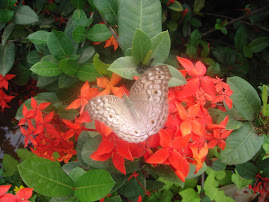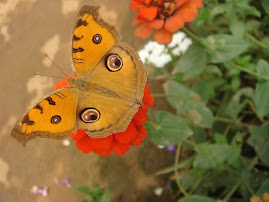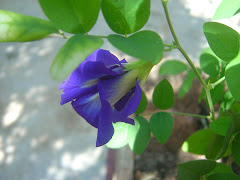
Damselflies (suborder Zygoptera) is an insect in the order Odanata.
Damselflies are similar to dragonflies but at rest the wings of the
damselflies are held along, parallel to the body at rest. The hindwing
is similar to the forewing while the hindwings of the dragonfly
broadens near the base. Damseflies are weaker fliers compared to
dragonflies. Their eyes are separate and look a little too big for
their slender bodies.
Over the past few months, I have taken many pictures of damselflies
in my garden. The most vibrant ones are the reds and the yellows.
The yellow ones in this post are rather pale-looking. Feeding time
is really the best time to get good shots. They're loathe to move
then, devouring the smaller insect down to the last morsel! I
hope you enjoy going through these pictures......





















































.jpg)
































20 comments:
Wow! Great shots.
RO :o)
You amaze me Kanak! Nalley and I have enjoyed these photos so much and marvel at how you can get such wonderful, crisp pictures. The colors of some are just so unusual. Thanks so much for sharing.
I love both Damselflied and Dragonflies...their beauty is spectacular...
Sandi
They are very beautiful, just like the dragonflies are.
I love seeing them Kanak! Love your new header pic too!
So many different colors! I love Damselflies, they are so graceful.
Wow Kanak, that is seriously a lot of damselflies! And you have photographed them reeeeeeeeaaally well too!
So many colours in damselflies! At is amazing how you do it!
Great shots of the damsels, Kanak! And I do like your new banner photo, too. The one with the burnt orange tip of its abdomen and turquoise thorax is quite a stunning specimen.
cheers,
Wilma
I love them all!
oh wow so many of them! Love to see these lovely pictures. TQ for snapping them! I like the change of banner picture of your blog too ;-D
wow, the colors on their bodies are amazing! thanks for sharing!
As I try to perceive
my garden in all
contexts flora and fauna,
I rarely get a chance
to find this type
of insects in the urban
context where I practice
horticulture. It is
a real pleasure to watch
them.
Congratulations and thanks
from Puerto Rico, USA.
RO...thanks for stopping by!!
Mildred...the most colourful ones turned out to be blurry!! Initially, it was difficult to snap them but it's much easier now:-)
Sandi/Noelle..thanks!
Susie...thanks! This coleus is putting on a show now. I just pinched back the blooms..and it was plain luck that I found this beauty here!
Sweetbay...they are, indeed.
Shawn...there's more! But I have to put a limit to the number of photos!:) They're getting used to me now!!!
Wilma..thanks! The one you mentioned is my favourite colour combination too! Glad you mentioned the header photo.
Sue...happy to read this!
Arati...how wonderful to have you here! Thanks!
Steph...glad you noticed! I can't stay with one (banner)for long;)
Padma...I was amazed to see the different colours. But now I think I've seen most of them.
Antigonon Cajan...damsels and dragons come to my garden because I live in a low-lying area. Empty plots of land are marshy and you often see clouds of dragonflies there. One advantage of living where I do.
Thanks for stopping by!
They are very fragile looking but very beautiful. I get a few around my pond in summer and they are a delight to watch.
EG...somehow the really red ones did not show up well in the photos. Maybe next year....in the height of summer....
Those shots are amazing!
Kanak... you must charm these precious jewels to have them pose for you. Great portraits. Carol
the one in the 3rd pic, with the orange tip, might be the orange-tailed marsh dart.
Post a Comment